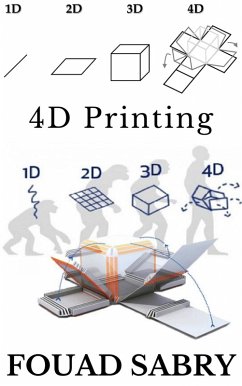What Is 4D Printing
3D printing, a type of additive manufacturing, is regarded as one of the most disruptive inventions in modern manufacturing. It has fundamentally altered the way components and equipments are made, as well as their design and development, in the industry. 3D printing enables manufacturers and researchers to create sophisticated shapes and structures that were previously thought to be impossible to create using traditional production methods. Over the previous three decades, 3D printing technology has seen constant breakthroughs and has changed dramatically. Despite its ability to generate sophisticated, bio-inspired, multi-material designs, 3D printing is not yet suitable for mass production.
The addition of a fourth dimension to 3D printing technology is known as "4D Printing." With this new dimension, 3D printed things can change shape independently of environmental stimuli such as light, heat, electricity, magnetic field, and so on. Printed items alter shape dynamically dependent on the needs and demands of the circumstance by incorporating the dimension of time, with no electromechanical or moving parts. The ability of 3D printed things to change shape over time in reaction to specific stimuli is based on the material's ability to transform over time in response to specific stimuli, and it does not require human interaction to facilitate the process.
The growing demand for flexible products in a variety of applications, such as self-folding packaging and adaptable wind turbines, has spurred the rise of 4D printing.
How You Will Benefit
(I) Insights, and validations about the following topics:
Chapter 1: 4D Printing
Chapter 2: Four-Dimensional Product
Chapter 3: Responsive Architecture
Chapter 4: Responsive Computer-Aided Design
Chapter 5: 3D Printing
Chapter 6: 3D Modeling
Chapter 7: 3D Scanning
Chapter 8: 3D Printing Marketplace
Chapter 9: 3D Bioprinting
Chapter 10: 3D Food Printing
Chapter 11: 3D Manufacturing Format
Chapter 12: 3D Printing Speed
Chapter 13: 3D Systems
(II) Answering the public top questions about 4D printing.
(III) Real world examples for the usage of 4D printing in many fields.
(IV) 17 appendices to explain, briefly, 266 emerging technology in each industry to have 360-degree full understanding of 4D printing' technologies.
Who This Book Is For
Professionals, undergraduate and graduate students, enthusiasts, hobbyists, and those who want to go beyond basic knowledge or information for any kind of 4D printing.
3D printing, a type of additive manufacturing, is regarded as one of the most disruptive inventions in modern manufacturing. It has fundamentally altered the way components and equipments are made, as well as their design and development, in the industry. 3D printing enables manufacturers and researchers to create sophisticated shapes and structures that were previously thought to be impossible to create using traditional production methods. Over the previous three decades, 3D printing technology has seen constant breakthroughs and has changed dramatically. Despite its ability to generate sophisticated, bio-inspired, multi-material designs, 3D printing is not yet suitable for mass production.
The addition of a fourth dimension to 3D printing technology is known as "4D Printing." With this new dimension, 3D printed things can change shape independently of environmental stimuli such as light, heat, electricity, magnetic field, and so on. Printed items alter shape dynamically dependent on the needs and demands of the circumstance by incorporating the dimension of time, with no electromechanical or moving parts. The ability of 3D printed things to change shape over time in reaction to specific stimuli is based on the material's ability to transform over time in response to specific stimuli, and it does not require human interaction to facilitate the process.
The growing demand for flexible products in a variety of applications, such as self-folding packaging and adaptable wind turbines, has spurred the rise of 4D printing.
How You Will Benefit
(I) Insights, and validations about the following topics:
Chapter 1: 4D Printing
Chapter 2: Four-Dimensional Product
Chapter 3: Responsive Architecture
Chapter 4: Responsive Computer-Aided Design
Chapter 5: 3D Printing
Chapter 6: 3D Modeling
Chapter 7: 3D Scanning
Chapter 8: 3D Printing Marketplace
Chapter 9: 3D Bioprinting
Chapter 10: 3D Food Printing
Chapter 11: 3D Manufacturing Format
Chapter 12: 3D Printing Speed
Chapter 13: 3D Systems
(II) Answering the public top questions about 4D printing.
(III) Real world examples for the usage of 4D printing in many fields.
(IV) 17 appendices to explain, briefly, 266 emerging technology in each industry to have 360-degree full understanding of 4D printing' technologies.
Who This Book Is For
Professionals, undergraduate and graduate students, enthusiasts, hobbyists, and those who want to go beyond basic knowledge or information for any kind of 4D printing.
Dieser Download kann aus rechtlichen Gründen nur mit Rechnungsadresse in A, B, BG, CY, CZ, D, DK, EW, E, FIN, F, GR, H, IRL, I, LT, L, LR, M, NL, PL, P, R, S, SLO, SK ausgeliefert werden.


